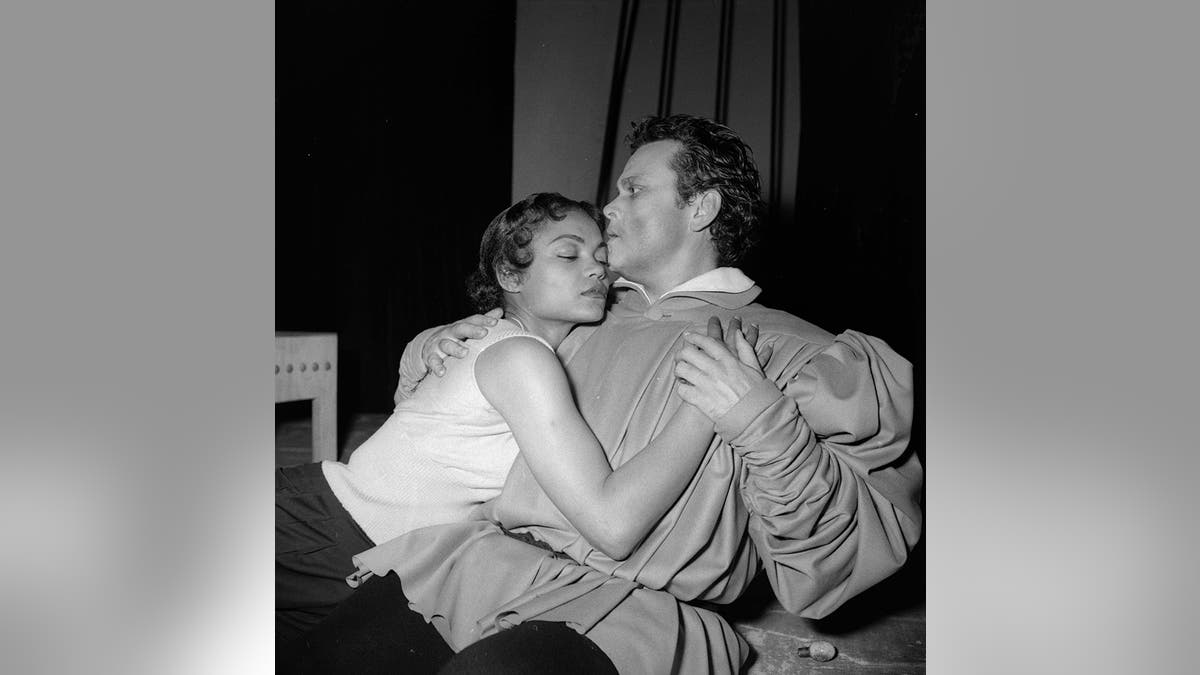
American actor and director Orson Welles (1915 - 1985) on stage as Faustus, with Eartha Kitt (1927 - 2008) , as Helen of Troy , in 'Time Runs...', Welles' version of the Faust legend, at the Théâtre des Mathurins in Paris, June 1950. (Photo by Lipnitzki/Roger Viollet/Getty Images) (Lipnitzki/Roger Viollet)
It’s been nearly 10 years since Hollywood star Eartha Kitt died on Christmas day in 2008 at age 81 from colon cancer. Now her daughter is speaking out about the loving relationship she shared with the screen icon.
Kitt McDonald Shapiro, who wrote a personal essay about her famous mother that was published by Closer Weekly Monday described how Kitt easily befriended some of the most recognizable men in Hollywood, all thanks to her magnetic personality.
EXCLUSIVE: CELEB PHOTOGRAPHER SPILLS OLD HOLLYWOOD SECRETS
“She was close to Orson Welles, and she was like a sponge around him because she was so drawn to his intensity and his incredible knowledge of many different subjects,” explained Shapiro. “People often thought they were lovers, but she said they never were. It was more of a mentorship.”
Welles wasn’t the only movie star to be impressed by Kitt.
"Her relationship with James Dean was another one the press assumed was romantic, but they were just dear friends as well," said Shapiro. "She called him Jamie, and she was very protective of him. She could sense his vulnerability and they shared a kinship. His death was something she did not really get over.”
Dean, who’s still recognized by fans for his role as rebellious Jim Stark in 1955’s “Rebel Without a Cause” met his death that same year at age 24 from a car crash.
The New York Times reported Kitt, who began performing in the late ‘40s as a dancer in New York, went on to achieve success in film, television, music and even Broadway.
However, there was one role that completely changed her life.
Shapiro revealed how thrilled Kitt was to become feisty feline Catwoman opposite Adam West in the “Batman” series from 1967 until 1968 – a role Julie Newmar and Lee Meriwether previously took on.
“I was about nine years old when she played Catwoman on ‘Batman’ and that was a really big deal,” explained Shapiro. “This was 1967, and there were no women of color at that time wearing skintight bodysuits, playing opposite a white male with sexual tension between them!
"She knew the importance of the role and she was proud of it. She really is a part of a history. She was one of the first really beautiful black women – her, Lena Horne, Dorothy Dandridge – who were allowed to be sexy without being stereotyped. It does take a village, but I do think she helped blaze a trail.”
Shapiro also noted Kitt was never afraid to voice her opinions – even if it landed her in hot water.
“I recently discovered boxes of letters she received after she spoke in 1968 at the White House and aired her views of the Vietnam War,” said Shapiro. “The letters were from both sides of the aisle, some attacking her and telling her what a horrible American and person she was. Some were very racist; others were incredibly supportive. But there were hundreds, and she kept all of them.
"It showed she was OK hearing both sides of the story, and she never understood why others weren’t. That was a difficult period for her, but she always felt that we’re all entitled to our own voices and it was OK to speak out and be heard.”
Still, Kitt’s political views wouldn’t prevent her from enjoying a lasting Hollywood career, as well as a close bond with her daughter and grandchildren. When Kitt passed away, it was Shapiro who was by her side.
“My mother didn’t leave this earth quietly,” recalled Shapiro. “She died screaming at the top of her lungs on Christmas Day in 2008, which I felt was symbolic of her strong survival instinct and how she never gave up. She wasn’t ever going to let go easily. After she passed, I turned to my husband and said, ‘I don’t know who’s waiting for her on the other side but, boy, I hope they’re prepared because they’re getting an unwilling participant!”
Shapiro added, “Even through my tears, I was able to smile because that was one of the gifts that she left me – the ability to find laughter and joy even in difficult times.”





